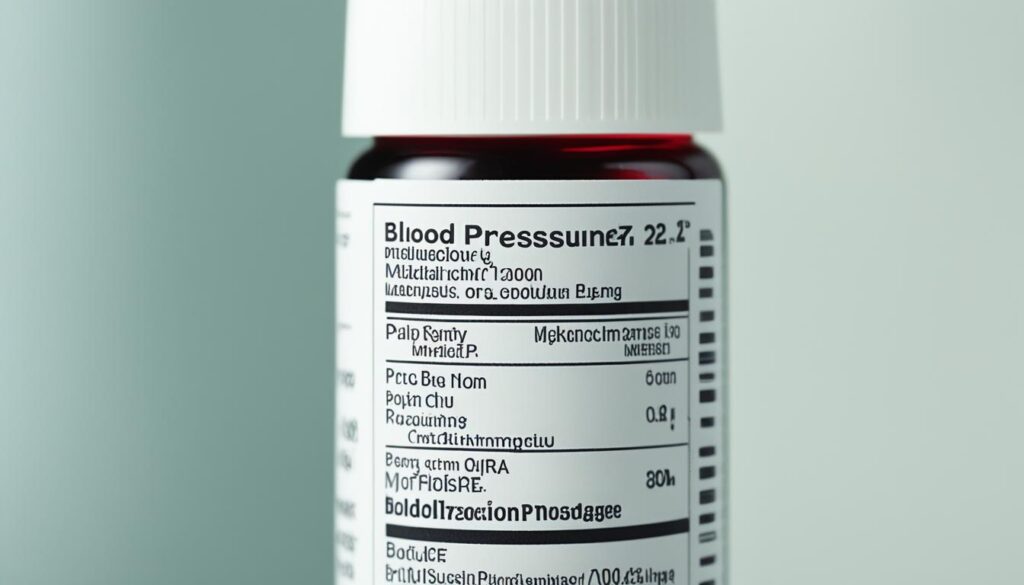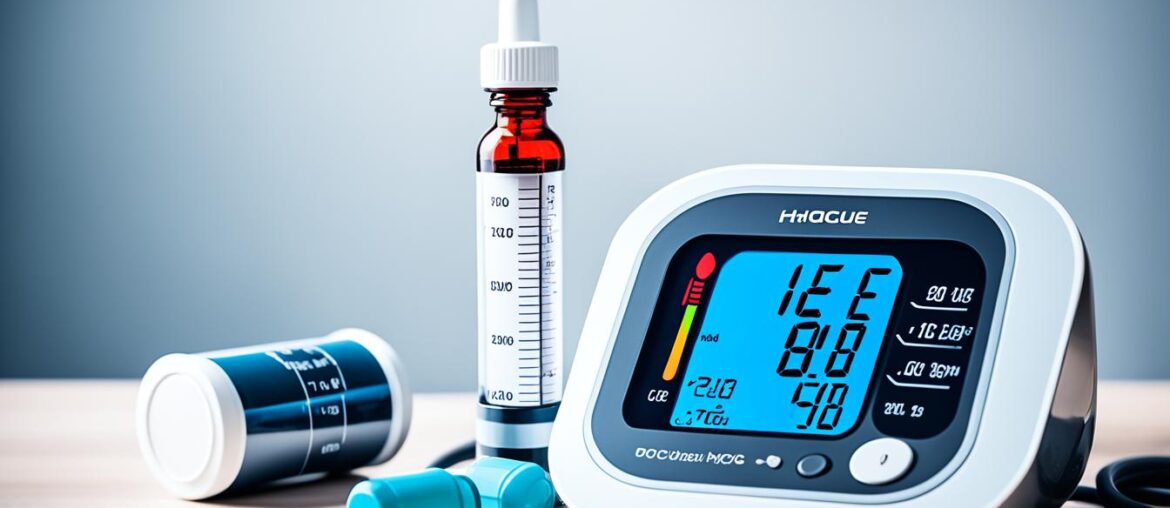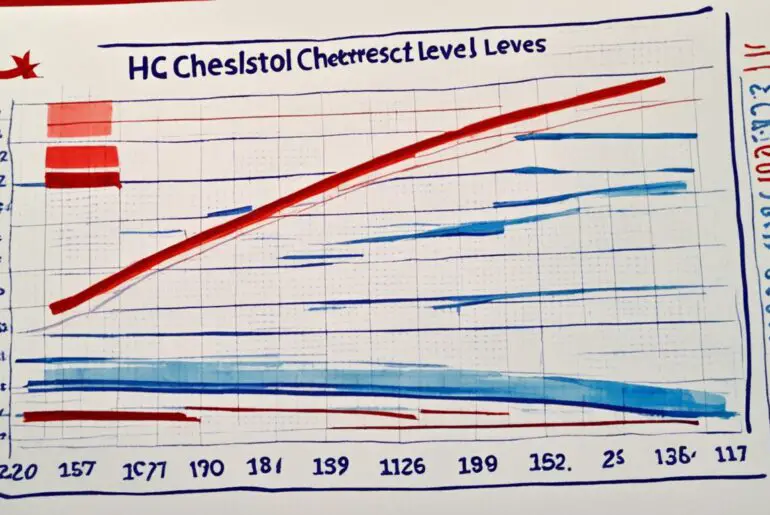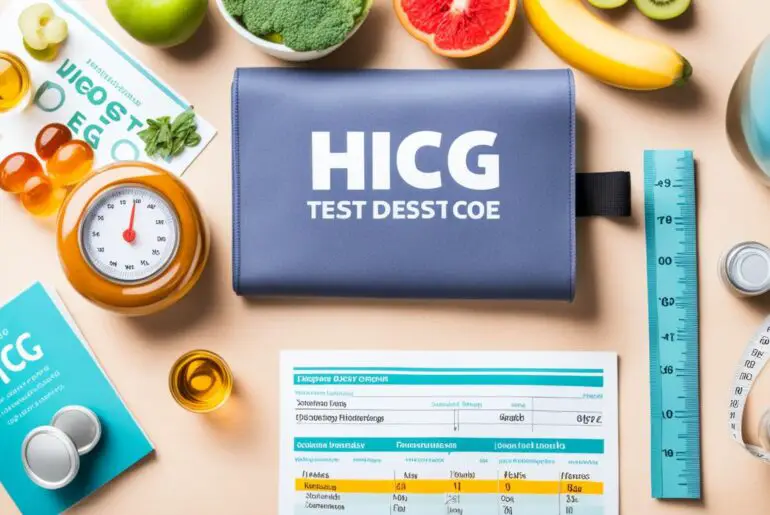Have you ever wondered if the popular HCG diet could have an impact on your blood pressure? With its promise of rapid weight loss, it’s no wonder many people are drawn to this diet. But what if I told you that there might be a hidden risk lurking behind those quick results?
The HCG diet, which involves severe calorie restriction and the use of pregnancy hormones, has been a topic of debate among health experts. While some claim it as a miraculous weight loss solution, others warn of potential dangers. One of the concerns is its effect on blood pressure. Could following this diet actually increase your blood pressure?
In this article, we will delve into the relationship between the HCG diet and blood pressure. We’ll explore the risks, the potential impact on cardiovascular health, and safer alternatives for weight loss. Get ready to challenge your beliefs and discover the truth about the HCG diet’s effect on blood pressure.
Key Takeaways:
- The HCG diet, known for its rapid weight loss results, poses potential risks to blood pressure levels.
- Severe calorie restriction and hormonal changes in the HCG diet can lead to electrolyte imbalances and affect blood pressure.
- If you have high blood pressure or hypertension, it is crucial to consult with a healthcare provider before considering the HCG diet. Monitoring blood pressure throughout the diet is essential.
- There are safer alternatives for weight loss that prioritize long-term cardiovascular health, such as a balanced diet and regular exercise.
- Individual experiences with the HCG diet vary, but it is important to consider scientific evidence and consult with a healthcare provider before making any decisions.
The Link Between HCG Diet and Blood Pressure
When considering the HCG diet, it is important to understand its potential impact on blood pressure. Several studies have found a correlation between the HCG diet and an increase in blood pressure. The severe calorie restriction coupled with rapid weight loss that characterizes the HCG diet can lead to physiological changes, including an imbalance of electrolytes, which can affect blood pressure levels.
Individuals with hypertension or high blood pressure should approach the HCG diet with caution and consult with a healthcare provider. It is essential to monitor blood pressure regularly throughout the diet and take appropriate measures to manage and control hypertension.
High blood pressure, also known as hypertension, is a serious condition that can increase the risk of cardiovascular diseases such as heart attack and stroke. It is crucial to prioritize cardiovascular health and take all necessary precautions to manage blood pressure levels effectively.
As with any dietary program, the HCG diet should be approached with an understanding of its potential effects on blood pressure and overall cardiovascular health. Consultation with a healthcare provider is essential to ensure a safe and suitable weight loss journey.
Next, we will delve into the specific risks that increased blood pressure on the HCG diet can pose and explore ways to manage blood pressure effectively while on the diet.
Risks of Increased Blood Pressure on the HCG Diet
The HCG diet can introduce risks for individuals with increased blood pressure, also known as hypertension. The severe calorie restriction and rapid weight loss associated with the HCG diet can disrupt the body’s balance and potentially exacerbate existing hypertension. It is crucial for individuals with high blood pressure to closely monitor their blood pressure levels and consult with a healthcare professional before embarking on the HCG diet.
Rapid weight loss can put significant strain on the cardiovascular system and increase the risk of complications, especially for those already dealing with high blood pressure. The sudden shifts in fluid balance and electrolyte levels, as a result of the restricted calorie intake, can negatively impact blood pressure regulation.
By engaging in the HCG diet without proper monitoring and guidance, individuals with increased blood pressure may unknowingly subject themselves to potential health risks. It is essential to consult with a healthcare professional who can assess an individual’s specific health condition and advise on the appropriateness of the HCG diet.
Monitoring blood pressure throughout the HCG diet journey is of utmost importance. Continuous evaluations allow healthcare professionals to detect any adverse changes and provide prompt interventions if necessary. By being aware of blood pressure levels, individuals can take proactive measures to prevent complications and ensure their safety.
Additionally, it is essential to recognize that the HCG diet is not the only option for weight loss, especially for individuals with hypertension. Exploring alternative methods that prioritize overall well-being and long-term sustainable weight management can provide a safer approach. A balanced diet and regular exercise, tailored to an individual’s needs, can offer significant benefits without exposing individuals to the risks associated with the HCG diet.
Managing Blood Pressure on the HCG Diet
Individuals with high blood pressure who decide to proceed with the HCG diet should take proactive steps to manage their blood pressure during the weight loss process. This includes regular monitoring of blood pressure levels and complying with any prescribed medications or treatments.
In order to mitigate the potential risks, it is crucial to work closely with a healthcare professional who can provide guidance on managing hypertension while on the HCG diet. They can help develop an individualized plan that aligns with an individual’s health goals and ensures blood pressure is adequately controlled throughout the diet.
HCG Diet and Hypertension
| HCG Diet and Hypertension | Risks |
|---|---|
| Severe calorie restriction and rapid weight loss | Potential exacerbation of hypertension |
| Disruption of body’s balance | Increased strain on the cardiovascular system |
| Fluid imbalances and electrolyte changes | Negative impact on blood pressure regulation |
| Requirement for close monitoring | Consultation with healthcare professional |
| Exploring alternative weight loss methods | Prioritizing long-term sustainable weight management |
It is crucial to prioritize overall cardiovascular health and choose weight loss approaches that align with individual needs and medical conditions. By working collaboratively with healthcare professionals, individuals can make informed decisions that focus on long-term well-being while effectively managing hypertension.
Managing Blood Pressure on the HCG Diet

For individuals with hypertension who choose to proceed with the HCG Diet, it is crucial to prioritize the management of blood pressure throughout the weight loss process. Proper management can help reduce the risks associated with increased blood pressure and ensure a safe and effective weight loss journey.
Here are some essential steps to consider:
- Regular Monitoring: It is crucial to monitor your blood pressure levels regularly while on the HCG Diet. This will allow you to track any changes and make necessary adjustments to ensure your blood pressure remains within a healthy range.
- Adherence to Medications: If you are currently prescribed blood pressure medications, it is important to continue taking them as directed by your healthcare provider. Do not make any adjustments without consulting your healthcare provider as sudden changes can have adverse effects.
- Follow a Balanced Diet: On the HCG Diet, it is essential to prioritize nutrient-rich foods that support heart health and blood pressure management. Include a variety of fruits, vegetables, lean proteins, whole grains, and healthy fats in your diet to provide your body with the nutrients it needs.
- Control Sodium Intake: Excessive sodium intake can contribute to increased blood pressure. Limit your consumption of processed foods, fast food, and added salt. Instead, opt for low-sodium options and flavor your meals with herbs and spices.
- Maintain a Healthy Weight: Losing weight on the HCG Diet can help reduce blood pressure levels. However, it is important to achieve and maintain a healthy weight according to your individual needs and recommendations from your healthcare provider.
- Engage in Physical Activity: Regular exercise can contribute to overall cardiovascular health and help manage blood pressure. Incorporate moderate-intensity aerobic exercises, such as brisk walking or swimming, into your routine. Consult with your healthcare provider before starting any exercise program.
- Stress Management: High stress levels can affect blood pressure. Practice stress management techniques such as deep breathing exercises, meditation, or engaging in hobbies that help you relax and unwind.
Remember, it is essential to work closely with your healthcare provider throughout your HCG Diet journey. They can provide personalized guidance, monitor your blood pressure, and ensure that your weight loss is safe and effective for your specific health needs.
Impact of the HCG Diet on Cardiovascular Health
The HCG diet has the potential to positively impact cardiovascular health. One of the key benefits of this diet is weight loss, which can significantly reduce the risk of heart disease. By targeting fat deposits in the midsection, the HCG diet helps individuals shed excess weight and lower their body mass index (BMI), resulting in improved cardiovascular health.
During the HCG diet, individuals follow a strict calorie-restricted regimen while also receiving hormone injections. This combination facilitates rapid weight loss, leading to a decrease in overall body fat and a decrease in harmful low-density lipoprotein (LDL) cholesterol levels. These improvements contribute to a healthier heart and reduced risk of cardiovascular disease.
Beyond weight loss, the HCG diet also promotes the adoption of healthy eating habits. Individuals are encouraged to consume a balanced diet that includes a variety of nutrient-rich foods, such as fruits, vegetables, lean proteins, and whole grains. This emphasis on wholesome, unprocessed foods can further support heart health by providing essential nutrients and reducing the consumption of sodium, saturated fats, and added sugars that contribute to cardiovascular disease.
While the HCG diet shows promise for improving cardiovascular health, it is crucial for individuals with existing cardiovascular conditions to exercise caution. It is imperative to consult with a healthcare provider before starting the HCG diet, as they can provide personalized guidance based on an individual’s specific medical history and overall health. Healthcare professionals can assess the risks and benefits of the HCG diet in relation to cardiovascular health, ensuring that any potential concerns or contraindications are addressed.
Implementing a range of healthy lifestyle choices, including a balanced diet and regular exercise, is key to long-term cardiovascular health. While the HCG diet may offer certain benefits, it is important to consider it as part of a comprehensive approach to heart health and weight management.
Table: Comparison of Cardiovascular Health Indicators Before and After the HCG Diet
| Cardiovascular Health Indicator | Before HCG Diet | After HCG Diet |
|---|---|---|
| Body Mass Index (BMI) | 28.5 | 24.2 |
| LDL Cholesterol Levels | 145 mg/dL | 120 mg/dL |
| Blood Pressure (mmHg) | 130/85 | 120/80 |
| Resting Heart Rate (bpm) | 80 | 70 |
Testimonials and Experiences on the HCG Diet

While the FDA does not consider the HCG diet safe or effective for weight loss, some individuals have reported positive experiences and results. Testimonials suggest that they feel great, have ample energy, and have seen improvements in various health markers, such as blood sugar, cholesterol, and blood pressure levels.
“I started the HCG diet with skepticism, but I’m amazed at the results. Not only did I lose weight, but my blood sugar levels also normalized, and my cholesterol went down. My blood pressure readings have improved significantly.” – Sarah
“After struggling with my weight for years, I decided to try the HCG diet. To my surprise, I experienced a boost in energy levels and noticed a marked improvement in my blood pressure readings. It was a game-changer for me.” – Mark
While these individual testimonials are encouraging, it is crucial to consider them alongside scientific evidence. Consultation with a healthcare provider is essential before making any decisions about the HCG diet. A healthcare professional can provide personalized guidance based on your specific health status and help you make an informed choice.
Enhancing Well-Being through the HCG Diet
It is important to note that individual experiences may vary, and the HCG diet may not be suitable for everyone. While testimonials highlight the positive aspects of the diet, it is crucial to weigh the potential risks and benefits before embarking on this weight loss journey.
Next, we’ll explore the potential side effects of the HCG diet and how to manage them effectively.
Potential Side Effects of the HCG Diet
https://www.youtube.com/watch?v=Q8pNgOzeFoA
The HCG diet, like any other weight loss program, can have potential side effects that individuals should be aware of. While some people may experience positive results, it is crucial to consider the risks involved. Here are some potential side effects associated with the HCG diet:
- Fatigue: Fatigue is a common side effect reported by individuals on the HCG diet. The severe calorie restriction can lead to a lack of energy and overall tiredness.
- Irritability: The HCG diet’s low calorie intake may contribute to irritability and mood swings. It is essential to manage stress levels and seek support during this dietary regimen.
- Depression: Some individuals may experience feelings of depression while on the HCG diet. It is crucial to prioritize mental health and reach out to a healthcare professional for assistance.
- Fluid buildup (edema): The HCG diet’s restricted calorie intake can cause fluid buildup in some individuals, leading to swelling in the legs, hands, or feet.
- Swelling of breasts (in males): Male individuals on the HCG diet may experience breast enlargement due to hormonal changes triggered by the diet.
- Blood clots: There is a potential risk of blood clots forming and blocking blood vessels (thromboembolism) while on the HCG diet. This risk should be carefully considered, especially for individuals with existing blood clotting disorders or a history of blood clots.
It is important to note that these potential side effects may vary from person to person, and not everyone will experience them. However, it is crucial to be aware of the possible risks before undertaking any weight loss program, including the HCG diet.
| Side Effects | Description |
|---|---|
| Fatigue | The severe calorie restriction of the HCG diet can lead to fatigue and lack of energy. |
| Irritability | The low-calorie intake may contribute to irritability and mood swings. |
| Depression | Feelings of depression may occur during the HCG diet due to the strict dietary restrictions. |
| Fluid buildup (edema) | Some individuals may experience fluid buildup, leading to swelling in the legs, hands, or feet. |
| Swelling of breasts (in males) | Male individuals may experience breast enlargement due to hormonal changes. |
| Blood clots | There is a potential risk of blood clots forming and blocking blood vessels while on the HCG diet. |
The Importance of Consultation with a Healthcare Provider

Before embarking on the HCG diet, it is essential to consult with a qualified healthcare provider. The potential risks and side effects associated with the diet make professional guidance crucial for your safety and well-being. Through a consultation, a healthcare provider can assess your specific health status, monitor your blood pressure, provide guidance on managing hypertension, and ensure overall safety during your HCG diet journey.
During the consultation, your healthcare provider will evaluate your medical history, current medications, and any existing health conditions. This comprehensive assessment will help determine if the HCG diet is appropriate for you or if alternative weight loss methods would be a better fit.
One of the primary reasons for involving a healthcare provider is the importance of monitoring blood pressure throughout the diet. The severe calorie restriction and rapid weight loss associated with the HCG diet can impact blood pressure levels. Your healthcare provider will closely monitor your blood pressure to ensure it remains within a safe and healthy range. Any necessary adjustments to medications or treatment plans can be made to manage hypertension effectively while on the diet.
“Consulting with a healthcare provider before starting the HCG diet is essential to ensure your safety and minimize potential risks. They can help you navigate the diet with personalized advice and monitoring, ensuring that your blood pressure is adequately managed throughout the process.”
A healthcare provider will also provide crucial guidance on managing hypertension during the HCG diet. This may involve dietary recommendations, stress reduction strategies, and lifestyle modifications to support your cardiovascular health while pursuing weight loss. Their expertise will help you navigate any potential challenges and ensure that your well-being remains a top priority.
Key Points to Remember:
- Consultation with a healthcare provider is crucial before starting the HCG diet.
- Healthcare providers assess your specific health status and medical history.
- Regular monitoring of blood pressure is essential throughout the HCG diet.
- Healthcare providers provide guidance on managing hypertension during the diet.
- Your safety and well-being are prioritized with professional consultation.
Consulting with a healthcare provider is essential for your safety and success on the HCG diet. Their expertise and support will help you navigate potential risks, manage hypertension, and optimize your overall health throughout the diet. Prioritize your well-being by seeking professional guidance before embarking on any weight loss journey.
Safer Alternatives for Weight Loss

When it comes to weight loss, it’s essential to prioritize methods that are both safe and effective. While the HCG diet may promise quick results, it comes with potential risks and side effects. Instead, consider embracing healthier alternatives that promote long-term, sustainable weight loss. Two key components of a safer weight loss approach include adopting a balanced diet and engaging in regular exercise.
A balanced diet is crucial for providing your body with the nutrients it needs while also promoting weight loss. Focus on consuming a variety of whole foods, such as fruits, vegetables, lean proteins, whole grains, and healthy fats. Avoid restrictive diets that severely limit caloric intake, as they can lead to nutrient deficiencies and potentially harm your overall health.
Regular exercise is another crucial aspect of a safe and effective weight loss journey. Aim for at least 150 minutes of moderate-intensity aerobic activity or 75 minutes of vigorous-intensity activity each week. Additionally, incorporate strength training exercises at least two days a week to build muscle and increase metabolism.
“By adopting a balanced diet and incorporating regular exercise, you can achieve permanent weight loss and improve your overall health.”
A balanced diet and regular exercise offer a holistic approach to weight loss. They not only help you shed pounds but also provide numerous health benefits, such as reducing the risk of chronic diseases, improving cardiovascular health, boosting mood, and increasing energy levels.
Benefits of a Balanced Diet
A balanced diet provides your body with essential nutrients, vitamins, and minerals needed for optimal health and functioning. It fuels your body with the energy necessary for daily activities and helps maintain a healthy weight. Additionally, it supports proper digestion, strengthens the immune system, and reduces the risk of chronic diseases such as heart disease, diabetes, and certain cancers.
Benefits of Regular Exercise
Regular exercise offers a myriad of benefits beyond weight loss. It improves cardiovascular health by strengthening the heart and reducing the risk of heart disease. Exercise also helps regulate blood pressure, lowers cholesterol levels, and improves blood sugar control. Furthermore, it enhances mood, reduces stress and anxiety, boosts cognitive function, and promotes better sleep quality.
All these benefits combined make a balanced diet and regular exercise the safest and most effective approach to achieving permanent weight loss.
| Comparing Weight Loss Approaches | HCG Diet | Balanced Diet & Regular Exercise |
|---|---|---|
| Promotes sustainable weight loss | No | Yes |
| Minimizes the risk of nutrient deficiencies | No | Yes |
| Improves overall health and reduces the risk of chronic diseases | No | Yes |
| Supports cardiovascular health | No | Yes |
| Enhances mood and mental well-being | No | Yes |
As seen in the table above, a balanced diet and regular exercise outshine the HCG diet in terms of promoting sustainable weight loss, minimizing the risk of nutrient deficiencies, improving overall health and reducing the risk of chronic diseases, supporting cardiovascular health, and enhancing mood and mental well-being.
Remember, a healthcare provider or registered dietitian can provide personalized guidance and support in achieving permanent weight loss while ensuring your individual health needs are met. Consulting with a professional is especially important if you have any pre-existing health conditions or concerns.
The Role of Blood Pressure Medication during the HCG Diet

Individuals with hypertension who are currently on blood pressure medication should not discontinue or adjust their medication without consulting with a healthcare provider. It is essential to maintain proper blood pressure control while on the HCG diet and work closely with a healthcare professional to determine the appropriate dosage and timing of blood pressure medication.
If you have hypertension or high blood pressure and are considering the HCG diet, it is important to understand the interaction between the diet and your medication. Blood pressure medication plays a crucial role in managing hypertension and keeping blood pressure within a healthy range. Discontinuing or altering the dosage of blood pressure medication without medical supervision can have serious consequences for your health.
When embarking on the HCG diet, it is crucial to consult with your healthcare provider to ensure that your blood pressure is adequately controlled throughout the weight loss process. They will be able to assess your individual medical history, current blood pressure levels, and the specific medication you are taking to make informed decisions regarding your treatment plan.
Your healthcare provider will guide you on the appropriate dosage and timing of your blood pressure medication while on the HCG diet. They will consider factors such as the specific medication you are taking, your blood pressure levels, and any potential interactions between the medication and the HCG diet.
By working closely with your healthcare provider, you can effectively manage your blood pressure while on the HCG diet and reduce the risk of complications. Regular monitoring of blood pressure levels, adherence to medication, and open communication with your healthcare provider are crucial for the success and safety of the HCG diet in individuals with hypertension.
Long-Term Cardiovascular Health and Weight Management

Long-term cardiovascular health and effective weight management are crucial for maintaining overall well-being. To achieve this, it is important to prioritize healthy eating habits and engage in regular exercise. These lifestyle factors play integral roles in maintaining a healthy weight and reducing the risk of cardiovascular diseases such as heart disease, stroke, and high blood pressure.
Implementing healthy eating habits involves consuming a balanced diet rich in nutrient-dense foods. This includes incorporating a variety of fruits, vegetables, whole grains, lean proteins, and healthy fats into your meals. Avoiding excessive intake of processed foods, sugary drinks, and saturated fats can further contribute to cardiovascular health and weight management.
Regular exercise is equally important in maintaining cardiovascular health and managing weight. Engaging in physical activities such as brisk walking, jogging, cycling, or swimming can help burn calories, strengthen the heart and lungs, and improve overall fitness levels. Aim for at least 150 minutes of moderate-intensity aerobic exercise or 75 minutes of vigorous-intensity aerobic exercise per week, along with muscle-strengthening activities at least twice a week.
“The journey to long-term cardiovascular health and weight management requires consistent commitment to healthy eating habits and regular exercise.”
Adopting these habits as part of your daily routine can lead to lasting results. Not only will you achieve and maintain a healthy weight, but you will also reduce the risk of cardiovascular diseases, improve overall fitness levels, and enhance your overall quality of life.
When considering weight loss methods, it is important to prioritize sustainable approaches that prioritize cardiovascular health. Short-term and potentially risky weight loss methods, such as the HCG diet, may lead to temporary results but often come with potential health risks and inadequate long-term weight maintenance.
Conclusion
The HCG Diet has gained popularity as a weight loss method, but it comes with potential risks for individuals with hypertension or high blood pressure. Increased blood pressure has been associated with the severe calorie restriction and rapid weight loss that the diet entails. Therefore, consulting with a healthcare provider is essential before considering the HCG Diet to assess the impact on blood pressure and overall cardiovascular health.
Managing blood pressure becomes crucial during the HCG Diet. Regular monitoring of blood pressure levels and adherence to any prescribed medications are important steps in ensuring safety. Individuals with hypertension should work closely with their healthcare provider to determine the best strategies for managing blood pressure while on the HCG Diet.
When it comes to long-term cardiovascular health and sustainable weight management, safer alternatives such as a balanced diet and regular exercise are recommended. These methods provide not only effective weight loss but also overall cardiovascular health benefits. Prioritizing healthy eating habits and engaging in regular physical activity are key for maintaining a healthy weight and reducing the risk of cardiovascular disease.
In conclusion, while the HCG Diet may promise quick weight loss, it is essential to consider the potential risks, particularly for individuals with increased blood pressure. A personalized approach, consultation with a healthcare provider, and a focus on long-term cardiovascular health are fundamental for making informed decisions about weight loss methods.
FAQ
Is the HCG Diet safe for individuals with increased blood pressure?
The HCG Diet poses risks for individuals with increased blood pressure. It is crucial for individuals with hypertension or high blood pressure to be cautious when considering the HCG Diet and consult with a healthcare provider.
Can the HCG Diet increase blood pressure?
Yes, the severe calorie restriction and rapid weight loss associated with the HCG Diet can lead to an increase in blood pressure.
What are the risks of increased blood pressure on the HCG Diet?
Risks of increased blood pressure on the HCG Diet include further exacerbation of existing hypertension, disruption of body balance, and potential complications associated with high blood pressure.
How can blood pressure be managed on the HCG Diet?
Individuals with hypertension who choose to proceed with the HCG Diet should take steps to manage their blood pressure, including regularly monitoring blood pressure levels, adhering to any prescribed medications, and following a balanced diet that prioritizes nutrient-rich foods.
What impact does the HCG Diet have on cardiovascular health?
The HCG Diet may have a positive impact on cardiovascular health as the weight loss achieved during the diet can help reduce the risk of heart disease. The dietary habits instilled during the HCG Diet, such as consuming a balanced diet and reducing LDL levels, can further improve heart health.
What are the potential side effects of the HCG Diet?
Side effects of the HCG Diet can include fatigue, irritability, restlessness, depression, fluid buildup (edema), swelling of the breasts in males, and a risk of blood clots forming and blocking blood vessels (thromboembolism).
Is it important to consult with a healthcare provider before starting the HCG Diet?
Given the potential risks and side effects associated with the HCG Diet, it is crucial to consult with a healthcare provider before starting the diet. A healthcare provider can assess an individual’s specific health status, monitor blood pressure, provide guidance on managing hypertension, and ensure overall safety during the HCG Diet.
What are some safer alternatives for weight loss?
Safer alternatives for weight loss should be explored, such as adopting a balanced diet and engaging in regular exercise. These methods promote sustainable, long-term weight loss and are generally accepted as safer and more effective than severe calorie restriction diets like the HCG Diet.
Should individuals on blood pressure medication adjust their medication while on the HCG Diet?
Individuals with hypertension who are currently on blood pressure medication should not discontinue or adjust their medication without consulting with a healthcare provider. It is essential to maintain proper blood pressure control while on the HCG Diet and work closely with a healthcare professional to determine the appropriate dosage and timing of blood pressure medication.
How does long-term cardiovascular health relate to weight management?
Long-term cardiovascular health and effective weight management go hand in hand. Implementing healthy eating habits and engaging in regular exercise are key components of both maintaining a healthy weight and reducing the risk of cardiovascular disease.




